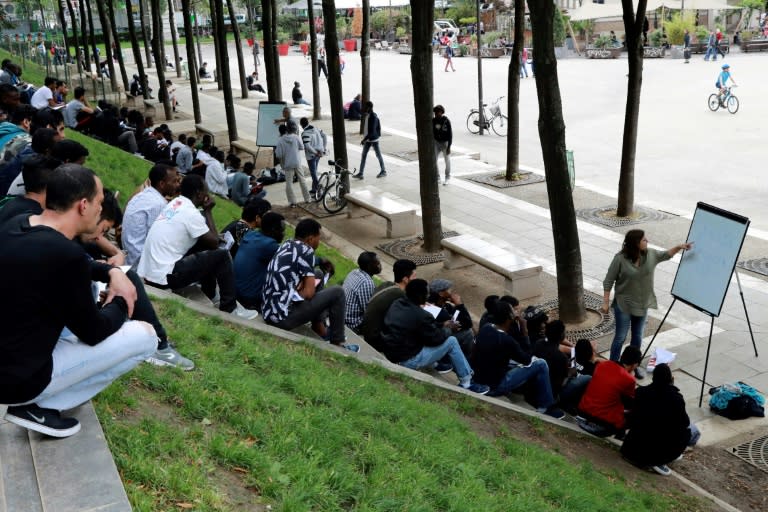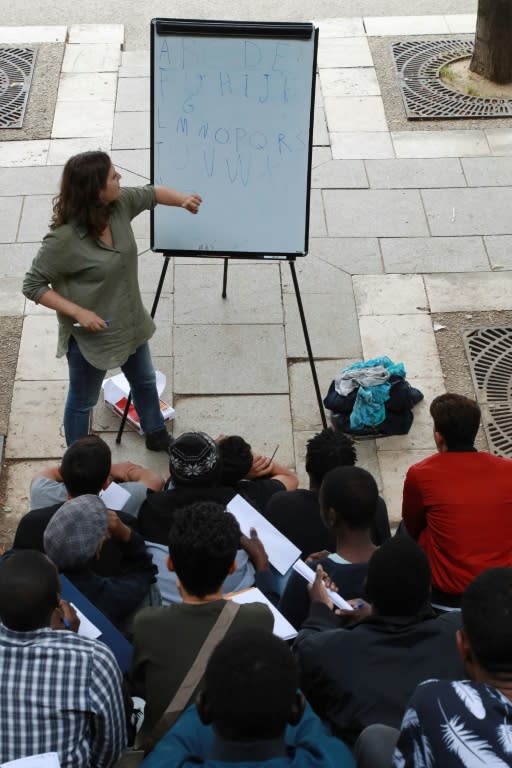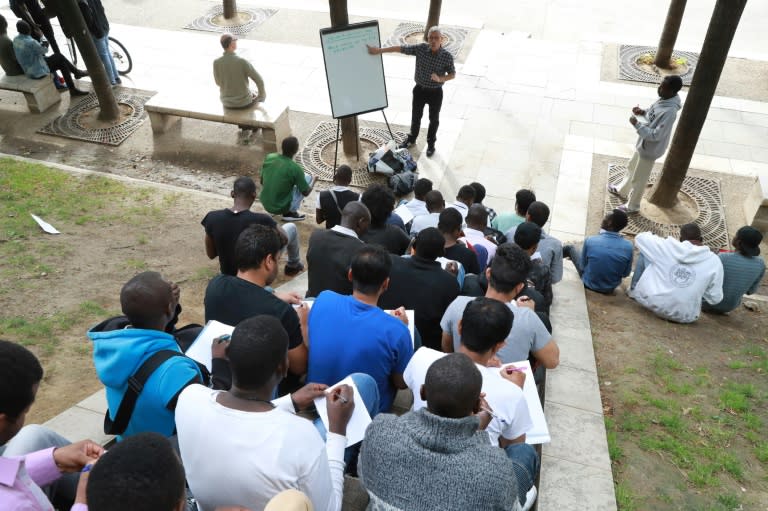School's out: migrants learn French on banks of Paris canal
Sitting in rows on a grassy embankment overlooking a Paris square, around 50 asylum-seekers recite the alphabet in French following a young woman pointing to letters on a whiteboard. "Ew", 22-year-old Louise shouts, attempting to make herself heard above the passing traffic and the music spilling out of a nearby bar. "Ooh!" comes the reply from the group of mostly Sudanese and Afghan youths, struggling to pronounce the tricky French 'u'. The migrants are attending free open-air language classes organised by a refugee support group at a dozen locations around the French capital. On a warm July evening two classes are under way on the banks of the Bassin de la Villette, part of the canals in northeast Paris near where migrants are often found sleeping rough. While Louise, who did not wish to give her full name, teaches beginners, Pierre Piacentini, a retired nurse, instructs Level 2 students on how to describe the various ailments they may find themselves explaining to a doctor. Many in Piacentini's group are regulars at the daily classes, who show up come rain or shine. "They were here when it was minus five degrees Celsius (23 Fahrenheit), they're here when it rains, when it's hot, when they have the sun in their faces. They're really into it basically," the energetic, white-haired volunteer said. A rare sight anywhere in the world in the 21st century, the teaching taking place under the trees in Paris causes passers-by to stop and stare. Founded in November 2015 at the height of the migrant crisis in Europe, the association BAAM aims to give asylum-seekers some of the support withheld by the state while their asylum claims are being processed. That includes language classes, with the French government only offering lessons to people who have received refugee status. "The problem is that the asylum processing times are very long. People want to learn French and they can't," complained Julian Mez, one of the founders of BAAM (French acronym for Office of Reception and Assistance for Migrants). He accused the state of holding up the integration process. - From street to school - President Emmanuel Macron, elected in May, has promised to cut the waiting times for asylum claims from around 18 months at present to six months. By the time the changes take effect the Level 2 students may have graduated on to the subjunctive tense. Omar, a 28-year-old Sudanese, began classes nine months ago. Before, he said, he knew "nothing". "Now, I speak well," he said proudly, in correct French. On the evening AFP visited the students were learning the vocabulary for the various parts of the body. "I've got a pain in my back," Piacentini tells the class, pressing a hand to his lower back and wincing with mock agony. The students, all males aged between 15 and 30, repeat the sentence in unison and jot it down diligently on notebooks balanced on their knees. The open-air classroom in the multi-ethnic Stalingrad neighbourhood in northeast Paris is next to an overhead metro line under which a sprawling migrant camp sprouted up last year. In November, police cleared the camp that was home to over 3,000 people and an official shelter was opened nearby, but migrants from across Africa, the Middle East and Asia continue to arrive. For those who attend the classes, France is the destination and not merely a transit point on the well-worn route to England via the port of Calais. Hissan, a 27-year-old Egyptian in the beginners' class, roamed for years around Europe before deciding to settle in Paris. He has found work in construction and can understand a lot of French. "But I cannot speak it," he said ruefully in English. - 'Like a drug' - Besides teaching French, BAAM's volunteers help migrants negotiate France's byzantine bureaucracy and complete forms. Piacentini has been teaching every day for nine months. "It's like a drug," he says, laughing. It is a steep learning curve both for teacher and pupil, as he discovered one day during a class about family. Amazed that all the Sudanese students, when asked to list their siblings, mentioned only their brothers, he asked: "Don't you have any sisters?" Later, one of the students took him aside and told him that it was inappropriate to ask Sudanese men about female relatives.




